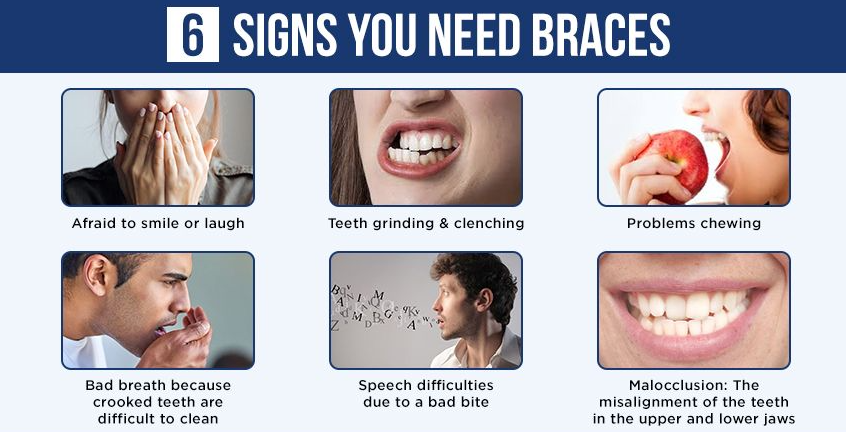The signs that an adult needs braces can vary according to age and overall dental health.
Adult braces are becoming increasingly common, and outcomes from adult braces are mostly positive.

A 1998 survey concluded that needing braces is more common than not needing them, estimating that only 35 percent of adults have perfectly aligned teeth.
Symptoms that can indicate you need braces include:
-
teeth that are visibly crooked or crowded
-
difficulty flossing between and brushing around crooked teeth
-
frequently biting your tongue or cutting your tongue on your teeth
-
teeth that don’t close over each other properly when your mouth is at rest
-
difficulty pronouncing certain sounds due to your tongue’s position under your teeth
-
jaws that click or make noises when you chew or first wake up
-
stress or fatigue on your jawline after chewing food
How to tell if your child needs braces?
Other signs include:
-
breathing through the mouth
-
jaws that click or make other sounds
-
being prone to biting the tongue, roof of the mouth, or inside of the cheek accidentally
-
thumb-sucking or using a pacifier past the age of 2
-
early or late loss of baby teeth
-
teeth that don’t come together even when the mouth is shut completely
-
teeth that are crooked or crowded
Poor nutrition during the infant and toddler stage, poor dental hygiene, and genetics are all reasons why children may end up needing braces.
Crowding is the most common condition addressed in orthodontic care. When there isn’t enough space in your mouth for all of your teeth, then you are experiencing crowding. Braces or orthodontic treatment at a young age can help with crowding, but even patients that had braces when they were younger can experience crowding as adults. Crowding gets worse as time goes on and can result in areas that are very difficult to brush and floss. When you aren’t able to keep your teeth clean, plaque accumulates and can cause tooth decay, gum disease, bad breath and bone loss around the teeth.
Gapping and spacing is the opposite of crowding. Those who have gaps in between their teeth may be missing a tooth or have a large jaw.
An overbite is caused when the upper front teeth excessively overlap the lower front teeth. This is not only noticeable but also comes with many health and oral problems. There is an increased risk or trauma to the front teeth and likelihood of fracturing the front teeth in the case of an injury. Overbites can also lead to extreme tooth wear and gum recession.
Opposite of the overbite, the underbite occurs when all of the upper front teeth are behind the lower front teeth. Typically this occurs when patients have a disproportionate jaw size. If you have difficulty chewing and biting, you may have an underbite. Underbites can also cause accelerated facial aging and an imbalanced facial appearance.
Do you have an upper tooth that crosses behind a lower opposing tooth? If so, you may have a crossbite. This is an abnormal bite and should not be left untreated. Without proper care, a crossbite can cause asymmetric jaw growth, extreme wear of teeth and increased gum recession of the affected teeth. Crossbites can be fixed, but if you wait too long, there can be an inability to restore fractured or worn teeth.
Another type of abnormal bite is the open bite. If you bite down and your teeth don’t touch, you could have an open bite. Typically open bites cause speech problems and difficulty biting.

Dr Fox is now excepting new Patients https://www.reallystraightwhiteteeth.com/ Stop Thumbsuck The Book >
